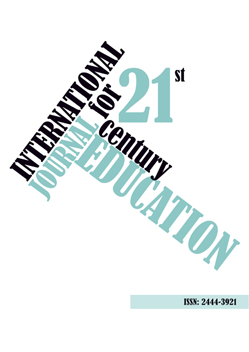Developing University Students' English reading and listening skills through online language learning
Contenido principal del artículo
Resumen
The panoply of technological applications in diverse educational contexts signals a necessity for continued inquiry into online language learning (OLL), especially in relation to its impact on different learner populations whose perception and acceptance of OLL can vary across settings. This pilot study involved over 200 Chinese students in a Hong Kong university and examined their OLL experience with respect to online activities that provided reading and listening skills practice. Results of the study suggest the easy availability of internet resources can greatly amplify students’ OLL experience, while raising four challenges in the areas of online materials development, student motivation, pedagogy-technology interface, and intercultural communicative competence. Possible ways of tackling such challenges are outlined. The article concludes with a view that successful OLL needs to be predicated on a tripartite framework of hardware, software and humanware.
Key words: Online language learning. Technology-enhanced language learning. English reading and listening skills.
Descargas
Detalles del artículo
Bibliografía
Amaral, L.A. & Meurers, D. (2011). On using intelligent computer-assisted language learning in real-life foreign language teaching and learning. ReCALL, 23(1), 4-24.
Blake, R. J. (2011). Current trends in online language learning. Annual Review of Applied Linguistics, 31, 19-35.
Chang, M.M. (2007). Enhancing web-based language learning through self-monitoring. Journal of Computer Assisted Learning, 23, 187-196.
Chau, J. & Lee, A. (2014). Technology-enhanced language learning (TeLL): An update and a principled framework for English for Academic Purposes (EAP) courses. Canadian Journal of Learning and Technology, 40(1), 1-24.
Chau, J., Wu, W, Chen, J., & Lughmani, S. (2012). ESL readers’ comprehension performance: The Chinese secondary context. English Language Teaching Journal, 66(3), 304-317.
Galloway, N. & Rose, H. (2014). Using listening journals to raise awareness of global Englishes in ELT. English Language Teaching Journal, 68(4), 386-396.
Godwin-Jones, R. (2003). Optimising web course design for language learners. In U. Felix (Ed.), Language learning online: Towards best practice (pp.43-56). Lisse: Swets & Zeitlinger.
Goh, C.C.M. (2013). ESP and reading. In B. Paltridge & S. Starfield (Eds.), The handbook of English for specific purposes (pp.55-76). DOI:10.1002/9781118339855
Hadfield, J. (2014). Chaosmos: Spontaneity and order in the materials process. In N. Harwood (Ed.), English language teaching textbooks: Content, consumption, production (pp.320-360). Basingstoke: Palgrave Macmillan.
Hemard, D. (2003). Language learning online: Designing towards user acceptability. In U. Felix (Ed.), Language learning online: Towards best practice (pp.21-42). Lisse: Swets & Zeitlinger.
Hirvela, A. (2013). ESP and reading. In B. Paltridge & S. Starfield (Eds.), The handbook of English for specific purposes (pp.77-94). DOI:10.1002/9781118339855
Hsu, C., Hwang, G., Chang, Y., & Chang, C. (2013). Effects of video caption modes on English listening comprehension and vocabulary acquisition using handheld devices. Educational Technology & Society, 16(1), 403-414.
Hung, S. A. & Huang, H.D. (2015). Blogs as a learning and assessment instrument for English-speaking performance. Interactive Learning Environments, DOI: 10.1080/10494820.2015.1057746
Kervin, L. & Derewianka, B.(2011). New technologies to support language learning. In B. Tomlinson (Ed.), Materials development in language teaching (2nd ed.) (pp.328-351). Cambridge: Cambridge University Press.
Lysenko, L.V. & Abrami, P.C. (2014). Promoting reading comprehension with the use of technology. Computers & Education, 74, 162-172.
Maley, A. & Prowse, P. (2013). Reading. In B. Tomlinson (Ed.), Applied linguistics and materials development (pp.165-182). London: Bloomsbury.
Matthews, J. & Cheng, J. (2015). Recognition of high frequency words from speech as a predictor of L2 listening comprehension. System, 52, 1-13.
Meskill, C. (Ed.) (2013). Online teaching and learning: Sociocultural perspectives. London: Bloomsbury.
Meskill, C. & Anthony, N. (2010). Teaching languages online. Bristol: Multlingual Matters.
Mishan, F. & Timmis, I. (2015). Materials development for TESOL. Edinburgh: Edinburgh University Press.
Mollering, M. & Levy, M. (2012). Intercultural competence in computer-mediated-communication: An analysis of research methods. In M. Dooly and R. O’Dowd (Eds.), Researching online foreign language interaction and exchange: Theories, methods & challenges (pp.233-264). Bern: Peter Lang.
Murphy, P. (2007). Reading comprehension exercises online: The effects of feedback, proficiency and interaction. Language Learning & Technology, 11(3), 107-129.
Pasfield-Neofitou, S. (2014). Language learning and socialization opportunities in game worlds: Trends in first and second language research. Language and Linguistics Compass, 8(7), 271-284.
Prowse, P. (2011). How writers write: Testimony from authors. In B. Tomlinson (Ed.), Materials development in language teaching (2nd ed.) (pp.151-73). Cambridge: Cambridge University Press.
Skyes, J.M. & Reinhardt, J. (2013). Language at play: Digital games in second and foreign language teaching and learning. Boston: Pearson.
Wible, D., Liu, A.L.E. , & Tsao, N.L. (2011). A browser-based approach to incidental individualization of vocabulary learning. Journal of Computer Assisted Learning, 27, 530-543.
Zhang, D. (2012). Vocabulary and grammar knowledge in second language reading comprehension: A structural equation modeling study. The Modern Language Journal, 96(4), 558-575.

